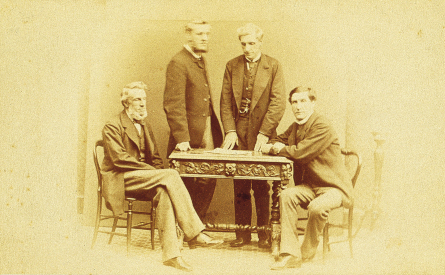
Family history
If one of your ancestors was connected with one of our constituent banks, we may hold information relating to him or her. We will be pleased to check our records on your behalf.
Using our archives for family history
When you contact us, we'll need to know the person's name; the bank with which he or she was connected; and any other details (such as birth, employment or death dates) that might prove helpful. Some banks' records are organised by branch, so we would also need to know a place of work in order to have a good chance of finding any relevant information.
The following notes outline several types of records that might be of particular interest. Please bear in mind that the quantity and quality of surviving records varies widely from bank to bank. For some, we have no archives at all, whereas for others we have quite detailed sets of records.
You can use this site to gain a general indication of whether we are likely to hold relevant records. Each bank's page in the Companies section gives a brief summary of its records in our archives. Please note, however, that these summaries are just a general guide; they do not guarantee that records are complete or comprehensive.
Staff registers and record cards
The content of surviving staff registers varies widely. Some give details of name, entrance exam mark, career path, and even information about marriage and children. Others give no more than a name and a list of transfer dates. In many cases, there will be no surviving register entry at all.
Staff registers are often organised by branch name, so we have a much better chance of finding your ancestor's records if you can tell us where he or she worked.
Please be aware that access to these records is restricted because they relate to the bank's confidential relationships with its employees. You can contact us for further advice.
Staff magazines
Staff magazines are often a good source of information about staff activities including promotions, retirements, weddings, sporting achievements and voluntary activities. Only a small proportion of staff ever appeared in their bank's magazine, but if they did, the article may even be accompanied by a photograph.
Some banks' staff magazines are indexed on our database, and we can search this for your ancestor's name. Alternatively, if you are interested in a particular event – for example, if your ancestor retired as manager of a particular branch in June 1952 – we can check the magazines around that time.
War memorials and records of war service
Many of our banks erected memorials in honour of members of staff who died in the two World Wars. We keep a database of these memorials.
Our website NatWest Group Remembers includes biographical information about staff of our banks who died in the First and Second World Wars.
A Book of Remembrance recording the names of all our employees who died in the Second World War and Korean War is available on this site's page about war memorials and remembrance.
Some banks also published rolls of honour – that is, lists of all staff who had served in the armed forces or who lost their lives during the two World Wars. The archive holds copies of these rolls.
Presscuttings
If your ancestor was a prominent or senior member of staff, for example, a partner, director or general manager, we may have presscuttings concerning him and his career.
Board minutes
This source is usually only suitable for confirming details you think you already know, because we need to know a name and a date before it is practical for us to begin a search. Any references we do find are likely to be extremely brief.
If your ancestor was a prominent employee of one of our constituent banks in the 18th or 19th centuries, he may be mentioned in the board minutes. For example, a senior staff member's appointment to a new post might be recorded, or the board may have recorded thanks to a manager when he retired.
Customer records
In general we do not hold customer records in the archives. As an exception, however, we do have account information relating to some 17th and 18th century customers of our oldest constituent banks. Please be aware that access to these records is restricted, because they relate to the bank's confidential relationships with its customers. You can contact us for further advice.